人教版新目标英语七年级下unit4
人教新目标七年级英语下册课堂笔记思维导图UNIT 4 Don't eat in class

keep away from
远离
keep doing sth.
继续做某事
keeper
饲养员;看守人;保管人
Section B 重点词汇
18. hair n. 头发;毛发
My mother has a few white hairs
black hair straight hair
u hair 作“头发”讲时,为不可数名词 u 强调“几根毛发”或头发的特征时,为可数名词
many
adj. 很多
much
adj. 很多
Do you want some more meat?
Section B 重点词汇
8. noisy adj. 吵闹的
反:quiet
安静的
noise
噪声
Turn the TV down, it’s too noisy.
Section B 重点词汇
9. relax v. 放松;休息
近: rest
休息
relaxed
感到放松的
relaxing
令人轻松的
You can relax in the living room.
Section B 重点词汇
10. read v. 读;阅读
I like reading.
read the newspaper
看报
read books
看书
She is wearing a white dress today.
wear a hat
戴着一顶帽子
wear glasses
戴眼镜
Section A 重点词汇
9. important
adj. 重要的
It’s very important to take your ID card when you travel.
人教版(新目标)2021寒假预习七年级英语下册Unit4(含答案)

Unit4 Don't eat in class! Unit 4单词(音标)rule [ruːl] n.规则;规章arrive [ə'raɪv]v.到达(be) on time 准时hallway ['hɔːlweɪ] n.走廊;过道hall [hɔːl]n.大厅;礼堂dining hall餐厅listen ['lɪs(ə)n]v.听;倾听listen to…听……fight [faɪt]v. & n.打架;战斗sorry ['sɒrɪ]adj.抱歉的;难过的;惋惜的outside [aʊt'saɪd;'aʊtsaɪd]adv.在外面adj. 外面的wear [weə]v.穿;戴important [ɪm'pɔːt(ə)nt]adj.重要的bring [brɪŋ]v.带来;取来uniform ['juːnɪfɔːm]n.校服;制服quiet ['kwaɪət]adj.安静的out [aʊt]adv.外出go out 外出(娱乐)practice ['præktɪs]v. & n.练习dish [dɪʃ]n.碟;盘do the dishes清洗餐具before [bɪ'fɔː]prep. & conj.在…以前adv.以前make (one’s) bed铺床dirty ['dɜːtɪ]adj.脏的kitchen ['kɪtʃɪn]n.厨房more [mɔː]adj. & pron.更多的noisy ['nɒɪzɪ]adj.吵闹的relax [rɪ'læks]v.放松;休息read [riːd]v.读;阅读terrible ['terɪb(ə)l]adj.非常讨厌的;可怕的feel [fiːl]v.感受;觉的strict [strɪkt]adj.严格的;严厉的be strict (with sb)(对某人)要求严格remember [rɪ'membə] v.记住;记起follow ['fɒləʊ]v.遵循;跟随follow the rules遵守规则luck [lʌk] n.幸运;运气keep [kiːp] v.保持;保留hair [heə] n.头发;毛发learn [lɜːn] v. 学习;学会Clark [kla:k]克拉克(姓;男名)Amy [eɪmɪ]埃米(女名)Molly['mɒlɪ]莫莉(女名)New York [nju: jɔ:k]纽约Unit4 知识梳理◆短语归纳1. on time 准时,按时2. listen to… 听……3. in class 在课上4. be latefor 做……迟到5. have to 不得不 6. be quiet 安静7. go out 外出 8. do the dishes 清洗餐具9. make breakfast 做早饭 10. make (one’s) bed 铺床11. be noisy 吵闹 12. keep one’s hair short 留短发13. play with sb. 和某人一起玩14. play the piano 弹钢琴15. have fun 玩得高兴 16. make rules 制订规则◆用法集萃 1. Don’t + 动词原形+其他。
人教版新目标七年级英语下册Unit4Don’teatinclass语法篇试题含答案
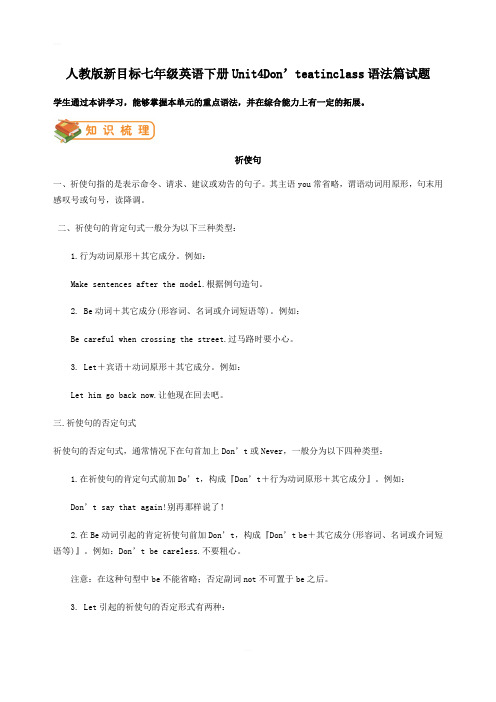
人教版新目标七年级英语下册Unit4Don’teatinclass语法篇试题学生通过本讲学习,能够掌握本单元的重点语法,并在综合能力上有一定的拓展。
祈使句一、祈使句指的是表示命令、请求、建议或劝告的句子。
其主语you常省略,谓语动词用原形,句末用感叹号或句号,读降调。
二、祈使句的肯定句式一般分为以下三种类型:1.行为动词原形+其它成分。
例如:Make sentences after the model.根据例句造句。
2. Be动词+其它成分(形容词、名词或介词短语等)。
例如:Be careful when crossing the street.过马路时要小心。
3. Let+宾语+动词原形+其它成分。
例如:Let him go back now.让他现在回去吧。
三.祈使句的否定句式祈使句的否定句式,通常情况下在句首加上Don’t或Never,一般分为以下四种类型:1.在祈使句的肯定句式前加Do’t,构成『Don’t+行为动词原形+其它成分』。
例如:Don’t say that again!别再那样说了!2.在Be动词引起的肯定祈使句前加Do n’t,构成『Don’t be+其它成分(形容词、名词或介词短语等)』。
例如:Don’t be careless.不要粗心。
注意:在这种句型中be不能省略;否定副词not不可置于be之后。
3. Let引起的祈使句的否定形式有两种:(1)Let开头的祈使句,如果后面跟第一、第三人称名词或代词的宾格,可在Let前加Don’t,也可在Let后宾格的名词或代词后面加not。
(2)如果以Let’s开头的祈使句,必须在Let’s后加not。
例如:Don’t let me go with her tom orrow. =Let me not go with her tomorrow.不要让我明天跟她一起去。
Let’s not tell her the truth whenever we meet her.无论什么时候我们碰到她,都不要告诉她真相。
人教版新目标七年级英语下册 Unit 4 教案

人教版新目标七年级英语下册 Unit 4 教案一. 教材分析人教版新目标七年级英语下册Unit 4主要围绕日常生活话题,培养学生运用英语进行简单交流的能力。
本单元包括三个部分:听说课、读课和综合语言运用课。
听说课主要训练学生听懂并能够运用日常用语进行交流;读课通过阅读培养学生的阅读理解能力;综合语言运用课则通过各种活动,让学生在实际语境中运用所学知识。
二. 学情分析七年级的学生已经掌握了基本的英语语音、词汇和语法知识,具备一定的英语听说读写能力。
但部分学生在语言运用方面仍有困难,需要通过大量的练习来提高。
此外,学生对日常生活中的英语交流感兴趣,但可能在实际操作中感到羞涩和紧张。
三. 教学目标1.知识目标:学生能够听懂、会说、会读本单元的生词和重点句子,掌握日常交流的基本表达方式。
2.能力目标:学生能够在日常生活中运用所学知识进行简单交流,提高英语应用能力。
3.情感目标:激发学生对英语学习的兴趣,培养积极向上的学习态度。
四. 教学重难点1.重点:本单元的生词、短语和句子。
2.难点:日常交流中动词时态的运用。
五. 教学方法采用任务型教学法,通过各种互动活动,让学生在实际语境中运用所学知识。
同时,运用分组合作、同伴互助等方法,激发学生的学习兴趣,提高课堂参与度。
六. 教学准备1.教师准备:提前熟悉教材,设计教学活动,准备相关教学资源。
2.学生准备:预习本单元的生词和句子,了解日常交流的基本表达方式。
七. 教学过程1.导入(5分钟)利用图片或实物引导学生谈论日常生活中的人物和事物,激发学生的学习兴趣。
2.呈现(10分钟)教师展示本课的生词和句子,让学生听懂并跟读。
同时,通过情景剧等形式,展示日常交流的基本表达方式。
3.操练(10分钟)学生分组进行角色扮演,模拟日常生活中的场景,运用所学知识进行交流。
教师巡回指导,纠正发音和语法错误。
4.巩固(5分钟)教师设计一些练习题,让学生口头回答,巩固所学知识。
5.拓展(5分钟)学生分组讨论,尝试用英语编写一个小故事,运用本课所学词汇和句型。
人教新目标版初中英语七年级下册Unit4单元测试卷(含答案)

人教新目标版初中英语七年级下册Unit4单元测试卷(含答案)人教新目标七下英语Unit4综合测试一、单项选择题(本大题共15小题,每小题1分,共15分)1.—When do you arrive________school every day?—________eight o'clock.A.at;At B.in;In C.in;At D.at;In2.We________be noisy in the library and we________keep the books clean.A.have to;must B.must;can't C.can't;have to D.have to;can't3.Many students don't like Li Wei because he often________for class.A.be late B.arrive late C.are late D.arrives late 4.—Can I listen to music here?—________.But you can listen to it in the hallways.A.Yes,please B.No,you can't C.No,you don't D.Yes,you can5.Nancy can't come to your party because she________do her homework.A.has to B.can't C.doesn't have to D.can6.Tom and his classmates have lunch in the school________every day.A.dining hall B.library C.hall D.classroom 7.—________?—We have to stay at home.A.What can you do B.What can I do for youC.What do you like to do D.What do you have to do8.You have to go to bed________10:00every night.You can't go to bed too late.A.after B.in C.before D.on9.My sister often________on weekends.A.does the dishes B.does the dish C.does dishes D.do the dish 10.—Does Bill have to go swimming?—________.A.Yes,he has B.No,he hasn't C.Yes,he does D.No,he isn't11.There are________rules at my home and________homework at school.I can't stand(忍受)them. A.too much;too many B.too many;too muchC.too much;too much D.too many;too many12.—What do you usually do in the morning?—I usually practice________the violin.A.to playing B.playing C.play D.to play13.—I can't watch TV in the evening.How about you?—________.A.I can,too B.I can,either C.I can't,too D.I can't,either 14.—Remember________a pen for me.—OK,I will.A.buy B.to buy C.buying D.bought15.My parents are very strict________me________my lessons.A.at;in B.in;with C.with;in D.in;at二、完形填空(每小题1分,满分10分)Hi,everybody!Welcome to Taiwan!Now I would like to show you1this island.After that,you will find that it is as beautiful as many2places in our country.Do you know anything about the Sun Moon Lake?You3ask why people call it so.If you fly high up4the lake and look down from the plane,you will find the answer by yourself.In the middle of this lake,there is a small island.People call it Pearl Island(珍珠岛)because it5like a pearl.On one side of Pearl Island,this lake islike the sun and on the other side it is like the moon.That is6 people call the lake the Sun Moon Lake.There are many mountains around this lake.The Ali Mountain is near the Sun Moon Lake.We will stay there7three days.You can also have a dance party with the local people.You can climb the mountain and watch the sun8slowly in the west.Of course,you can9early and enjoy the beautiful sunrise(日出)in the morning.Now,do you think Taiwan is a wonderful place10?1.A.below B.over C.of D.around2.A.other B.the other C.else D.others3.A.want B.may C.can D.need4.A.on B.in C.over D.past5.A.sounds B.looks C.sees D.watches6.A.when B.why C.what D.where7.A.for B.with C.in D.till8.A.rise up B.go down C.fly away D.go up9.A.put up B.set up C.look up D.get up10.A.to visit B.visit C.visits D.visiting三、阅读理解(每题2分,共30分)AI’m Li Yanqun.I’m an English teacher.This is a picture of my home.You can see a big house in it. You can see a small garden with many red and yellow flowers in front of the house,too.In the house,we have many rooms,such as a kitchen,a dining room,a bathroom,a big living room and a nice study.We also have three bedrooms.One is for my son.One is for my wife and me.The rest one is for the guest.We cook food in the kitchen and have meals in the dining room.In our living room,there are some sofas and a big TV set.My family often watch TV there.In the study next to the living room,there is a gray and white computer.My son oftendoes his homework there.Sometimes he plays games on the computer.I have anice home and a happy family.()1.I have a____house with a____garden.A.big;smallB.small;smallC.small;bigD.big;big()2—Where is my garden?—It’s______.A.behind the houseB.in front of the houseC.in the front of the houseD.next to the house()3.—How many rooms are there in my home?—There are____.A.5B.3C.8D.We don’t know()4.Our computer is______.A.next to the living roomB.in the studyC.in the living roomD.in my bedroom()5My son often does his homework_______.A.in the studyB.in the living roomC.in his bedroomD.in the gardenBTom and Kate are brother and sister.They like music.Kate can play the piano.But she can't play the violin.Tom can't play the piano,but he can play the violin.T oday they want to carry a piano into Kate's bedroom.The piano is big.They can't carry it.Kate and Tom's parents aren't at home.They can't help them to carry the piano.But they have two cousin sisters here today.They ask them to help.6.Tom and Kate are_.A.twinsB.BrothersC.brother and sisterD.sisters7.What can Kate play?_A.The piano.B.The violin.C.The flute(笛子).D.The guitar.8.Who can play the violin?A.Tom.B.Kate.C.Their cousin sisters.D.Their parents.9.Why don't their parents help them to carry the piano?A.Because it's big.B.Because they are old.C.Because they're at home.D.Because they aren't at home.10.Who help them to carry the piano?_A.Their parents.B.Their cousin sisters.C.Their classmates.D.Their teachers.CBob works in an office.Every morning he has breakfast at seven thirty,reads his newspaper,drinks a cup of coffee and then goes to work.One morning,he is still at the table reading his newspaper at8o'clock. He asks his wife for another cup of coffee.His wife asks him,“Aren't you going to the office today?”“The office?”He jumps up from his chair,“I think I am in the office.”11.Bob is_.A.a bus driverB.an office workerC.a primary school teacherD.a waiter12.Bob_before he goes to work.A.has breakfastB.reads his newspaperC.drinks a cup of coffeeD.A,B and C13.Bob_today.A.can go to work lateB.must go to workC.doesn't go to workD.should go to work early14,Bob_this morning.A.has a cup of coffee at homeB.has two cups of coffee at homeC.has a cup of coffee in his officeD.has two cups of coffee in his office15.Bob thinks_.A.today is SundayB.he is in the officeC.he works very hardD.he is at home.四、词汇.根据汉语、音标和首字母提示填写单词,注意大小写.(共1O分)1.She can also t____stories.2.Please c____Jack at536-0527.3.Can he s____his song?4.It's good habit to brush our____(牙齿)three times a day.5.Jeff is making faces.He looks as____(滑稽可笑的)as Mr.Beans.6.I usually get d____at half past six in the morning.7.I am____(从不)late for school.8.Mike's grandma____(居住)here but his parents don't.9.It takes about h____an hour.10.Does Jerry like these TV____(节目)?五、用所给词的正确形式填空.(共10分)1.It is easy____(write)as toy in English.2.Please brush your____(tooth)everyday!3.Mr.Brown likes____(go)fishing on the weekend.4.____(think)for your help and I know how to do it.5.It usually takes me2hours____(do)my homework every day./doc/a912935928.html,rry and Dick are waiting for you at the bus____(stop).7.The old woman can't run____(quick).8.Are you good at____(dance),Bob?9.Do you want____(join)us?10.My mother works eight____(hour)every day.六、单词拼写(每小题1分,满分10分)A)根据句意,写出括号内所给单词的适当形式,每空一词。
七年级英语下册《Unit4 Don’t eat in class Self check》课件 (新版)人教新目标版

Don’t talk loudly at night.
1. Fill in the blanks with the words in the box.
arrive late listen to be noisy follow the rules be strict
My name is Timmy the Mouse. I must get up early at 6:30 a.m. every morning. Then I have to go to the kitchen to get food for Grandpa. I never arrive late to the kitchen because I have to get there before the cat gets up. My grandpa always tells me I can’t be noisy . I listen to him because I don’t want the cat to get me! My grandpa is strict with me, but I think it’s best to follow the rules !
2. listen / teacher
Listen to the teacher. We must / have to listen to the teacher.
3. be noisy / library
We must not be / can’t be / Don’t be noisy in the library.
ExercisesⅠ. 词汇
1. Speak l______. I can’t hear you. oudly 2. Jack learns the piano in Children’s
人教版新目标英语七年级下第四单元教案设计
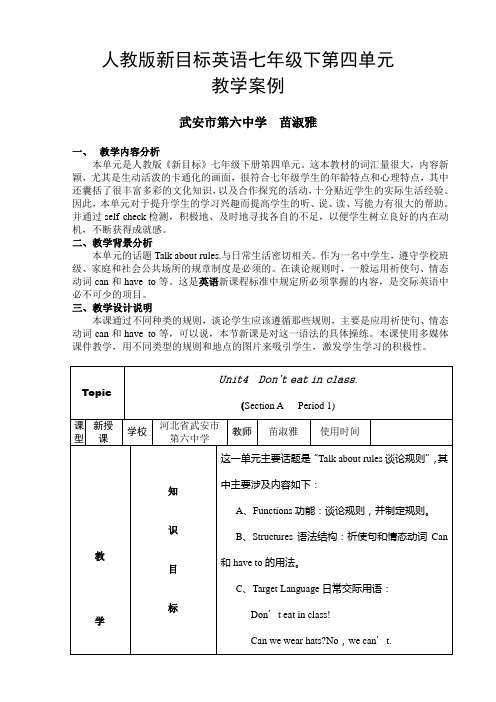
人教版新目标英语七年级下第四单元
教学案例
武安市第六中学苗淑雅
一、教学内容分析
本单元是人教版《新目标》七年级下册第四单元。
这本教材的词汇量很大,内容新颖,尤其是生动活泼的卡通化的画面,很符合七年级学生的年龄特点和心理特点,其中还囊括了很丰富多彩的文化知识,以及合作探究的活动,十分贴近学生的实际生活经验。
因此,本单元对于提升学生的学习兴趣而提高学生的听、说、读、写能力有很大的帮助。
并通过self check检测,积极地、及时地寻找各自的不足,以便学生树立良好的内在动机,不断获得成就感。
二、教学背景分析
本单元的话题Talk about rules.与日常生活密切相关。
作为一名中学生,遵守学校班级、家庭和社会公共场所的规章制度是必须的。
在谈论规则时,一般运用祈使句、情态动词can和have to等。
这是英语新课程标准中规定所必须掌握的内容,是交际英语中必不可少的项目。
三、教学设计说明
本课通过不同种类的规则,谈论学生应该遵循那些规则,主要是应用祈使句、情态动词can和have to等,可以说,本节新课是对这一语法的具体操练。
本课使用多媒体课件教学,用不同类型的规则和地点的图片来吸引学生,激发学生学习的积极性。
人教版新目标七年级英语下册Unit4说课稿

人教版新目标七年级英语下册 Unit 4 说课稿一. 教材分析人教版新目标七年级英语下册Unit 4主要围绕“日常生活”这一主题展开,通过学习本单元,学生能够掌握日常生活中的一些常用表达方式,提高他们的口语交际能力。
本单元的主要内容包括:动词短语的运用、现在进行时态的运用、日常交际用语等。
二. 学情分析七年级的学生已经掌握了基本的英语语法和词汇,但对日常生活中的一些交际用语还不太熟悉。
因此,在教学过程中,教师需要注重引导学生运用所学知识进行实际交流,提高他们的口语表达能力。
三. 说教学目标1.知识目标:学生能够掌握本单元的生词和短语,理解日常交际用语的含义和用法。
2.能力目标:学生能够熟练运用现在进行时态进行日常交际,提高他们的口语表达能力。
3.情感目标:激发学生学习英语的兴趣,培养他们积极参与课堂活动的自信心。
四. 说教学重难点1.重点:学生能够掌握现在进行时态的运用,以及日常交际用语的表达。
2.难点:学生能够灵活运用现在进行时态进行日常交际,并在实际情境中正确使用。
五. 说教学方法与手段1.教学方法:采用任务型教学法,情境教学法,分组合作学习等。
2.教学手段:利用多媒体课件、图片、卡片等辅助教学,激发学生的学习兴趣。
六. 说教学过程1.导入:通过展示图片,引导学生谈论图片中的人物正在做什么,引入现在进行时态的学习。
2.新课呈现:教师通过情境教学,展示日常交际用语,引导学生学习并掌握相关短语和表达。
3.课堂练习:学生分组进行角色扮演,运用所学知识进行实际交流,教师给予指导和反馈。
4.巩固环节:学生进行听力练习,观看相关情景对话,理解并运用日常交际用语。
5.拓展环节:学生进行小组讨论,创造性地运用所学知识,创作自己的日常交际对话。
6.总结:教师对本节课的主要内容进行总结,强调现在进行时态的运用和日常交际用语的重要性。
七. 说板书设计板书设计要简洁明了,突出重点。
主要包括现在进行时态的构成、日常交际用语的表达等。
人教版七年级下册英语Unit4短语句子默写课件

2d 默写
1.我叫约翰。今天是我来校的第一天 2.嗨,约翰 我是艾丽斯。这是一所很棒的学校,但有很多校规 3.真的吗?有些什么校规呢? 4. 上课不许迟到,这点十分重要 5.好吧 所以我们必须守时。我们可以把音乐播放器带到学校吗 6.不,不可以的。并且我们总是穿校服(上学) 7.我知道了 8. 奥,我们还必须在图书管保持安静。
Can we wear a hat in class? Yes, we can./No, we can’t.
Does he have to wear a uniform at school? What do you have to do?
Yes, he does./No, he doesn’t. We have to be quiet in the library.
在音乐教室 在外面听音乐 在教室吃东西 在餐厅里吃东西 在外面吃 戴帽子
2a-2b
in the music room listen to music outside eat in the classroom eat in the dining hall eat outside wear a hat
1.太多规则 2整理你的床铺 3.在厨房 4.有更多规则 5.不要吵闹 6.不能放松 7. 读书 8.要求严格 9.制定规则来帮助我们 10 遵守规则 11.好运气 12.对某人要求严格 13 .对某事要求严格 14. 考虑
Section B 2b 课文
too many rules make your bed in the kitchen have more rules don’t be noisy can’t relax read a book be strict make rules to help us follow the rules good luck be strict with sb. be strct in sth. think about
人教版新目标七年级英语下册Unit4单元检测卷(含答案详解)

Unit 4 Don’t eat in class2.arrive late for = be late for 做某事迟到Don’t arrive late for school.上课不要迟到。
1.else / other 别的,其他的else修饰疑问词或不定代词,位于其后。
Other修饰名词,位于其前。
What else do you have to do? 你们还必须做什么事?I have something else to tell you.我还有别的事情要告诉你。
Where are the other boys? 其他的男孩在哪儿?2.have to / must1)have to“必须,不得不”,表示客观需要,即受客观条件限制不得不或必须去做某事。
2)must表示说话人的主观看法。
3)must只用于现在时,在表示过去、将来和完成时,用have to 的相应形式来代替must.My mother is ill, I have to look after my sister at home.我妈妈病了,我必须在家照看我妹妹。
You must be careful. 你一定要小心。
3.practice doing sth 练习做某事4.too much / too many / much tootoo much“太多”,修饰不可数名词。
too much water太多水too many“太多”,修饰可数名词复数。
too many children太多孩子much too“太”,修饰形容词或副词。
much too small太小6.after school放学后after class 下课后7.on school nights 在上学期间的晚上8.No talking! 禁止谈话!1No+名词或动名词,表示禁止、不要做某事。
No smoking! 禁止吸烟!No parking!禁止停车!No swimming! 禁止游泳!No photos! 禁止拍照No noise!禁止喧哗!9.I have to be in bed by ten o’clock.我必须在10点之前上床睡觉。
人教新目标版初中英语七年级下册Unit4 Don’t eat in class课时练习题含答案
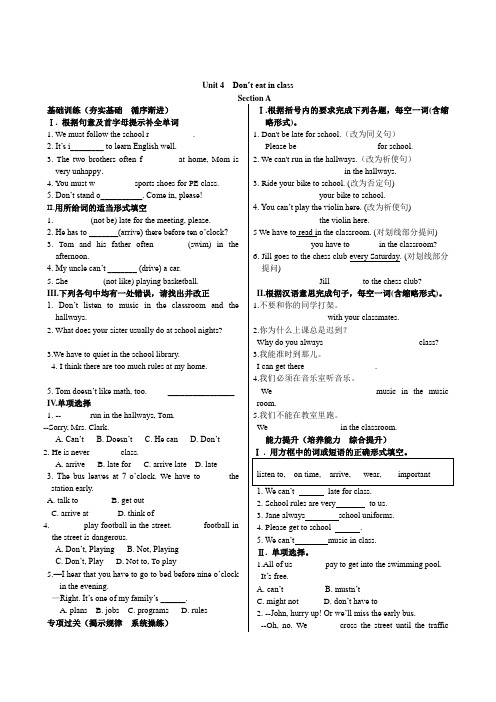
Unit 4 Don’t eat in classSection A基础训练(夯实基础循序渐进)Ⅰ. 根据句意及首字母提示补全单词1. We must follow the school r __________.2. It’s i________ to learn English well.3. The two brothers often f________ at home, Mom isvery unhappy.4. You must w_________ sports shoes for PE class.5. Don’t stand o__________. Come in, please!II.用所给词的适当形式填空1. ________ (not be) late for the meeting, please.2. He has to _______(arrive) there before ten o’clock?3. Tom and his father often _______(swim) in theafternoon.4. My uncle can’t _______ (drive) a car.5. She ________(not like) playing basketball.III.下列各句中均有一处错误,请找出并改正1. Don’t listen to music in the classroom and thehallways. ________________ 2. What does your sister usually do at school nights?________________3.We have to quiet in the school library. ___________4. I think there are too much rules at my home.________________ 5. Tom doesn’t like math, too. ________________ IV.单项选择1. --_______run in the hallways, Tom.--Sorry, Mrs. Clark.A. Can’tB. Doesn’tC. He canD. Don’t2. He is never _______class.A. arriveB. late forC. arrive lateD. late3. The bus leaves at 7 o’clock. We have to______ the station early.A. talk toB. get outC. arrive atD. think of4. _______ play football in the street. _______football in the street is dangerous.A. Don’t, PlayingB. Not, PlayingC. Don’t, PlayD. Not to, To play5.—I hear that you have to go to bed before nine o’clockin the evening.—Right. It’s one of my family’s ______.A. plansB. jobsC. programsD. rules专项过关(揭示规律系统操练)Ⅰ.根据括号内的要求完成下列各题,每空一词(含缩略形式)。
人教版新目标英语七年级下册:Unit 4 《Don't eat in class》

Unit4 Don’t eat in class!附参考答案一.单项选择.1.____ late. It’s your first day to work.A. Don’t to beB. Don’t beC. Don’tD. No 2.-______sing! -All right.A. LetB. Let’sC. We let3.When will the train ______?A. arriveB. arrive atC. reachD. arrive in4.I ______ but I _______ nothing.A. listened ; heardB. listened; hearC. heard; heardD. heard; listened5.The girl ______ the red dress is Jill Green.A. withB. wearC. put onD. in6.-Do you have an eraser?-______. I have _______ eraser.A. No; notB. Not; noC. No; noD. Not; not7. Mary usually _____ her dog at weekend.A. walkB. takesC. go withD. walks8. Don’t ______ bed by 9 o’clock.A. goB. inC. be inD. go in9. We can’t go out _______ school nights.A. atB. inC. onD. by10. He can’t meet his friends tonight because he _______ do homework.A. has toB. needC. have toD. don’t have to11. It’s very warm. You ______ to wear the coat.A. mustB. d on’t have toC. have toD. mustn’t12. Don’t go into the classroom _______ the teacher.A. withB. togetherC. withoutD. with not13. He can’t _______, but he often _______ to the beach and play.A. swimming, goB. swim, goesC. swims, goesD.swim, go14. Does she always wear _______?A. uniformB. sneakerC. a uniformD. a sneaker15. There are ________ rules in our class.A. many tooB. too muchC. much tooD. too many16. Tom never ________ fun at home.A. have muchB. has anyC. have anyD. has many二.句型转换。
新人教版新目标英语七年级下册Unit4全单元精品课件(共248页PPT)
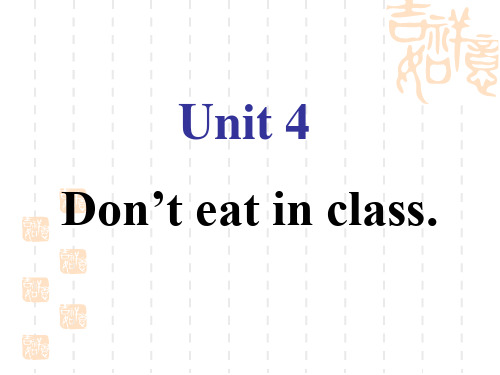
Can we get to class late?
No, we can’t. We can’be t late for class =arrive late for class .
Don’t arrive late for class. You must be on time. 准时 Don’t be late for class.
小结:
arrive + in (大地方)
at (小地方) get 必须与to 搭配才能加宾语。后面 如接地点副词,则不用介词to。
学为所用
– –
A in Shanghai? When did your uncle ______ The day before yesterday. A. arrive B. get
Peter ___ 2
Amy ____ 3
Mike ____ 4
1.独立完成! 2. 组内互查! 3.全班展示 !
2分钟
Listen again and fill in the blanks. Ms Clark: Hey, Peter. You know the_____. rules _______________________. Don ’t run in the hallways Peter: Sorry, Ms Clark. Mr. Smith: Amy,_______________________ don’t eat in the You must eat in the dining hall ___________________________. classroom. Amy: Oh, sorry, Mr. Smith. Don’t listen Mr. Smith: Hey, Mike. _____________ ____________, Mike! to Boy 1: He_____ hear you, Mr Smith. canin ’class t music
2020七年级英语下册 Unit 4 Don’t eat in class短语、语法知识点汇总 (新版)人教新目标版
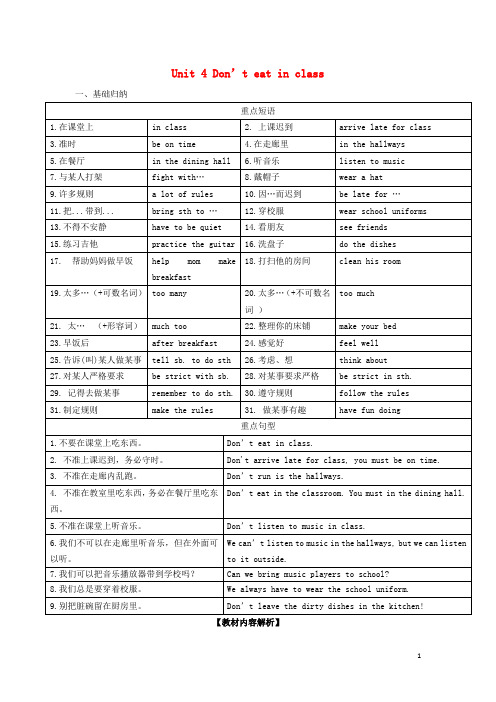
Unit 4 Don’t eat in class 一、基础归纳【教材内容解析】Section A1.Don’t arrive late for class. (P. 19)arrive作不及物动词,表示“到达”,接宾语时,需要加上介词in或者at。
When did you arrive?We are arriving at the station at two o’clock.【拓展】reach表示“到达”时,是及物动词,后面直接接表示地点的名词作宾语。
另外两个表示“到达”的动词(get和arrive)都是不及物动词,get to+地点;arrive in/at+地点。
After a long way, they reached/got to/arrived at the top of the mountain finally.2.You must be on time. (P. 19)on time用作固定短语,表示“准时、按时”,in time表示“及时”。
The train arrives on time.The ambulance(救护车) arrives in time.3.Don’t listen to music in class. (P. 19)listen用作不及物动词,表示听的动作,后接宾语时,需要加上介词to,hear强调听的结果,表示“听到”。
This girl likes to listen to music.Can you hear anything?4.Don’t fight. (P. 19)fight此处用作动词,意为“打架”,fight with sb.意为“与某人打架”。
Why do you sometimes fight with others?5.listen to music outside (P. 20)outside表示“在外边”,反义词为inside“在……里面”。
人教版新目标七年级英语下册 Unit 4 教学设计

人教版新目标七年级英语下册 Unit 4 教学设计一. 教材分析人教版新目标七年级英语下册Unit 4主要围绕日常生活中的交通工具展开。
本单元通过介绍不同交通工具的特点和使用场景,让学生学会表达各种交通工具的名称和用途,以及如何描述交通工具的特点。
教材包括听力、口语、阅读和写作等方面的内容,旨在提高学生的综合语言运用能力。
二. 学情分析七年级的学生已经掌握了基本的英语语法和词汇,具备一定的听说读写能力。
但部分学生对英语学习仍存在恐惧心理,不敢开口说英语。
此外,学生对日常生活中的交通工具较为熟悉,但如何用英语表达交通工具的特点和用途仍需加强。
三. 教学目标1.知识目标:学生能够掌握有关交通工具的词汇和表达方式,如bus,trn, car, subway等,以及描述交通工具特点的句子结构。
2.能力目标:学生能够用英语进行简单的日常交流,如询问和介绍交通工具的名称、用途和特点。
3.情感目标:培养学生热爱生活,关注环境保护的意识。
四. 教学重难点1.重点:交通工具的词汇和表达方式,以及句子结构的运用。
2.难点:如何准确描述交通工具的特点和用途。
五. 教学方法采用任务型教学法、情境教学法和交际教学法,以学生为主体,教师为主导,通过听力、口语、阅读和写作等多种活动,让学生在实际情境中感知、理解和运用语言。
六. 教学准备1.准备相关交通工具的图片、视频等教学资源。
2.设计听力、口语、阅读和写作等教学活动。
3.准备黑板、粉笔等教学工具。
七. 教学过程1.导入(5分钟)利用图片或视频展示不同交通工具,引导学生谈论交通工具的名称和用途。
2.呈现(10分钟)呈现本节课的主要内容,包括交通工具的词汇和表达方式,以及描述交通工具特点的句子结构。
3.操练(15分钟)通过听力、口语、阅读和写作等多种活动,让学生在实际情境中感知、理解和运用语言。
1)听力活动:播放一段关于交通工具的录音,学生听后回答问题。
2)口语活动:学生分组讨论,用英语介绍自己喜欢的交通工具。
Unit+4+Section+B++课件+2023-2024学年初中英语人教版新目标七年级下册

before she ___
can watch TV.
4. At school, Molly ____
can’t be noisy or eat in
class.
5. Parents and schools make rules to help
2. When does she have to get up every
morning?
She has to get up at six o’clock.
2c Task 4 Read the letters again. Complete
the sentences with have to/must, can or can’t.
students. So students ______
have to follow the
rules.
Pair Work
Molly is talking to Dr. Know face to face.
A: Dr. Know. I am very unhappy about the rules.
⑤She
can play basketball only on weekends.
⑤________________________________________________
⑥________________________________________________
⑥She
has to read a book before she can watch TV.
不同
Sum up
1. can & can’t
七年级英语下册 Unit 4 I want to be an actor Period 5课件 人教新目标版
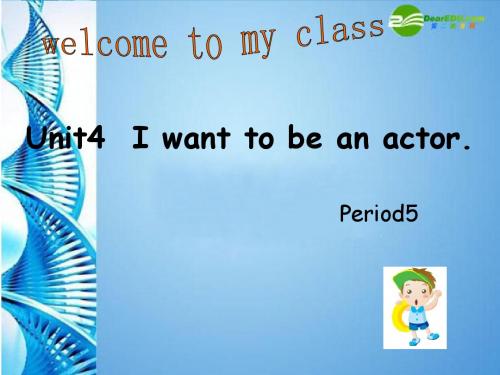
1. Where are the children from? They are from Japan, Canada and Singapore. 2. How many languages can a teacher speak? Four. 3. What sports can a P.E teacher play? He can play soccer, volleyball and tennis. 4. What can a music teacher do in this school? She can play guitar, piano and violin.
Dear Sir or Madam, I am a …
(把课堂知识与实际生活联系起来,使所学的语言知识更有 把课堂知识与实际生活联系起来, 把课堂知识与实际生活联系起来 用武之地. 用武之地 )
Unit4 I want to be an actor.
Period5
actor
waiter
doctor policeman
student
reporter bank clerk shop assistant
1
actor
3 4 Memory Game 6 7 8
2
5
waiter doctor Now let’s play a memory game! 在最短的时间里看谁记的又多又 policeman 谁就赢了. 准,谁就赢了.
Imagine you are a P.E teacher. Write and explain why you are a good person for the job.
Dear Sir or Madam, I am a P.E teacher. I can speak… kinds of four languages: English, French, Japanese and Chinese. I can play soccer, volleyball and tennis well. I am sure I can teach the children from Japan, Canada and Singapore to play these ball games well in your school. Please write and tell me if I can. Tony
人教版 新目标七年级英语下Unit4六课(获奖教案)
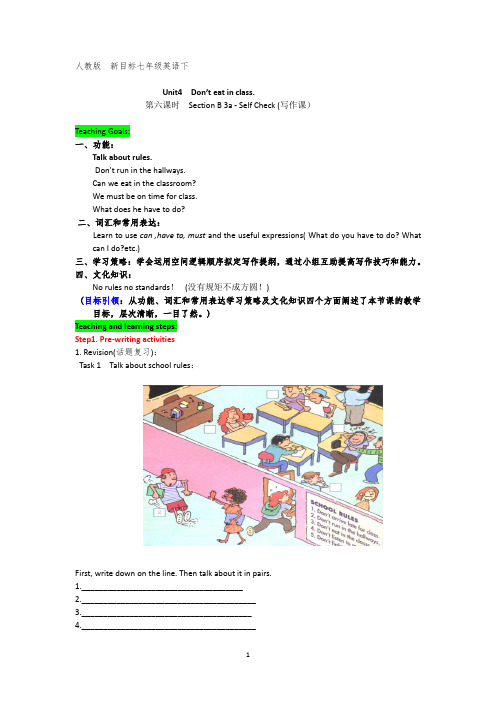
人教版新目标七年级英语下Unit4 Don’t eat in class.第六课时Section B 3a - Self Check (写作课)Teaching Goals:一、功能:Talk about rules.Don’t run in the hallways.Can we eat in the classroom?We must be on time for class.What does he have to do?二、词汇和常用表达:Learn to use can ,have to, must and the useful expressions( What do you have to do? What can I do?etc.)三、学习策略:学会运用空间逻辑顺序拟定写作提纲,通过小组互助提高写作技巧和能力。
四、文化知识:No rules no standards!(没有规矩不成方圆!)(目标引领:从功能、词汇和常用表达学习策略及文化知识四个方面阐述了本节课的教学目标,层次清晰,一目了然。
)Teaching and learning steps:Step1. Pre-writing activities1. Revision(话题复习):Task 1 Talk about school rules:First, write down on the line. Then talk about it in pairs.1._____________________________________2.________________________________________3._______________________________________4.________________________________________5.________________________________________ Task 2 Talk about family rules.First, ask and answer in pairs. Then write it down on the line.Task 3 Make sentence.Use can, can ’t, have to/must and don ’t to write about the rules at school.(Self check 2) 1. arrive late/class _____________________________________ 2. listen/teacher ______________________________________ 3. be noisy/library _________________________________ 4. speak English/English class __________________________ 5. eat/dinning hall __________________________________【设计意图】坚持“以生为本,先学后教”的理念,强调学生的参与、体验、感知,落实基本语言点,以学定教,教师根据具体学情适当微调后续环节的教法。
- 1、下载文档前请自行甄别文档内容的完整性,平台不提供额外的编辑、内容补充、找答案等附加服务。
- 2、"仅部分预览"的文档,不可在线预览部分如存在完整性等问题,可反馈申请退款(可完整预览的文档不适用该条件!)。
- 3、如文档侵犯您的权益,请联系客服反馈,我们会尽快为您处理(人工客服工作时间:9:00-18:30)。
2. Are there many rules at school? _Y__es_,_t_h_e_r_e_a_r_e_. _
3. Can he bright music players to school? _N_o_,_h_e__c_a_n_’t_.____
• No, smoking! No , parking!
practice
Don’t sleep in class.
Don’t wear hats in class.
Don’t dance in the classrooms.
Don’t talk in class.
Don’t listen to music in the classrooms.
A:So, eat in the dining hall.
What rules are these students breaking?
• 1. Don’t arrive late for class. • 2. Don’t run in the hallways. • 3. Don’t eat in the classroom. • 4. Don’t listen to music in the
2a Listen. Check the activities Alex
and Christina talk about.
2b
2b Activity
1.___ listenLtoismtuesicninathge calaisnsro.oCmas onr hAallwleayxs andcan can’t
• eat in class • listen to music outside • wear hats in school • fight in class • speak loudly in the
library
2d Read the conversation in 2d and answer the questions.
(No, we can’t.)
(√ ) read a book. (×) wear hats in class (×) listen to music in class (×) eat in the classrooms
(×) arrive late for school
We can We can’t
开头是动词原形。
祈使句有肯定和否定两种: 肯定:动词原形+宾语+其他! e.g. Look out! 小心!
Wait here for me! 在这等我!
Come in, please! 请进! Sit down, please. 请坐。 Open the door, please. 请开门。 否定的祈使句是在动词原形前(即句首)加Don't. Don’t +动词原形+宾语+其他 e.g. Don't talk in class! 不要在课常上讲话! Don't open the window! 别开窗! Don’t arrive late for school. 上学别迟到 ! Don’t smoke! /No smoking ! 别吸烟!
•
(Don’t let sb do sth)
• eg: Let him not run in the hallway.
• Don’t let him run in the hallway.
Be 型: Be+表语+其他
• Be quiet , please. • Don’t be worry.
No 型:No+名词/动名词
4. Do they have to always wear the school uniform? _Y_e_s_,_t_h_e_y_d_o_.____
2d. Role-play the conversation.
John: Hi, my name’s John. It’s my first day at school.
B:No,we can’t . We can’t listen to music in class .
A:So,don’t listen to music in class .
A:Can you fight with your classmates?
B:No,we can’t . We can’t fight .
Don’t eat in class.
A:Can you run in the hallways? B:No,we can’t . We can’t run
in the hallways.
.
A:So,don’t run in the hallways.
A:Can you listen to music in class?
Alice: Hi, John. I’m Alice. This is a great school, but there are a lot of rules.
John: Really? What are some of the rules? Alice: Well, don’t be late for class. This
A:So,don’t fight.
A:Can you do your homework in the class?
B:yes,we can . We can do our homework in the class.
A:So., do homework in the class.
A:Can you wear uniform in the school?
A: Can we listen to music, Alex? B: We can’t listen to music in the hallways, but we can listen to it outside.
Practice
Can we ……? Yes ,we can . No, we can’t.
classrooms or the hallways. • 5. Don’t fight.
1a. Write the number
of the rule next to
5
the student.
SCHOOL RULES
1. Don’t arrive late
3
4
for class. You must
Don’t run in the hallways.
Don’t use phone in class.
1 2
5
6
10
What are the rules
at our school?
3
4
7
9 8
Don’t arrive late for class.
11
School rules:
1. _D_o_n_’_t_ arrive late for class/school.
2.___ eat in the classrooms
can can’t
C3.__h_rwieasrtainhaat do these activities? can can’t
C4.__i_rclislteen “tocmausnic”outosidre “can’t” above can can’t
2. Don’t eat _i_n__c_l_as_s__.
试
3. _D__o_n_’t_ fight.
试
4. _D_o_n_’_t _ run in the __h_a_l_lw__ay_s___.
你
5. _D_o_n_’_t _ __li_s_te_n___to__ music in the
准
classrooms/hallways.
B:yes,we can . We can wear uniform in the school .
A:So, wear uniform in the school
A:Can you eat in the dining hall?
B:yes,we can . We can eat in the dining hall .
the library.
5. have to与must 1) have to意为“必须做某事”强调“客 观需要”
be on time.
2. Don’t run in the
hallways.
3. Don’t eat in the
classroom. You must
eat in the dining hall. 2
4. Don’t listen to music
in class.
5. Don’t fight.
do homework in class. play computer games listen to the teachers in class. watch TV on school nights read a book. wear hats in class listen to music in class eat anything in class draw on the wall ride bikes at school
1b Listen. What rules are these students breaking? Write the numbers after the names.
Peter ______ Amy ______ Mike ______
Grammar
1. 祈使句是表示请求、命令、叮嘱、号召、 劝告等的句子; 通常省略主语you; 句中谓语 动词用动词原形; 句尾一般用降调; 祈使句的
